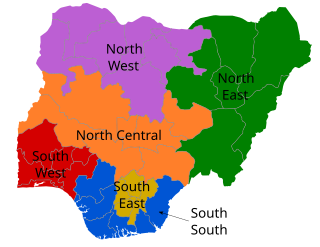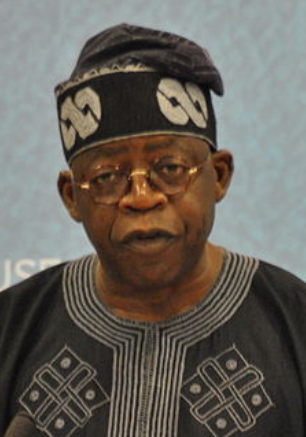Related Research Articles

The Ijaw people, otherwise known as the Ijo people, are an ethnic group found in the Niger Delta in Nigeria, with significant population clusters in Bayelsa, Delta, and Rivers. They also occupy Edo, Ondo, and small parts of Akwa Ibom. Many are found as migrant fishermen in camps as far west as Sierra Leone and as far east as Gabon. They account for about 1.8% of the Nigerian population according to CIA Factbook. The Ijaws are one of the most populous tribes inhabiting the Niger Delta region and the eighth largest ethnic group in Nigeria.

The Niger Delta is the delta of the Niger River sitting directly on the Gulf of Guinea on the Atlantic Ocean in Nigeria. It is located within nine coastal southern Nigerian states, which include: all six states from the South South geopolitical zone, one state (Ondo) from South West geopolitical zone and two states from South East geopolitical zone.

Rivers State, also known as Rivers, is a state in the Niger Delta region of southern Nigeria. Formed in 1967, when it was split from the former Eastern Region, Rivers State borders include Imo and Anambra to the north, Abia and Akwa Ibom to the east, and Bayelsa and Delta to the west.The State capital, Port Harcourt, is a metropolis that is considered to be the commercial center of the Nigerian oil industry.
The Defaka are a small ethnic group of south-eastern Nigeria, numbering fewer than a thousand people. They live in the eastern part of the Niger Delta, Rivers State, Bonny District; part of them in the Defaka ward of Nkoroo town in close relationship with the Nkoroo people, and another part of them on the isolated island of Iwoma Nkoro, near Kono. Present neighbours of the Defaka, apart from the Nkoroo people, are: at Iwoma, the Ogoni people, and to the east, the Obolo. The Defaka have a less cordial relationship with these peoples than with the Nkoroo.

Okrika is an island in Rivers State, Nigeria, capital of the Local Government Area of the same name. The town is situated on an island south of Port Harcourt, making it a suburb of the much larger city.
The Eleme people are one of the various groups of indigenous peoples that inhabit the Niger Delta region of South-South Nigeria.
Bonny Island is situated at the southern edge of Rivers State in the Niger Delta region of Nigeria near Port Harcourt. Ferries are the main form of transport, though recently an airstrip has been built and it’s fully functional - with flights from Lagos, Abuja and Port Harcourt respectively to and from the island. The local dialect spoken in Bonny Island is Ibani, an Ijaw language.
The Izonlanguages, otherwise known as the Ịjọ languages, are the languages spoken by the Izon people in southern Nigeria.

The Nigerian National Assembly delegation from Rivers comprises three Senators representing Rivers East, Rivers West, Rivers South East and thirteen Representatives representing Degema/Bonny, Okrika/Ogu-Bolo, Asalga/Akulga, Ahoada West/Ogba-Egbema-Ndoni, Port Harcourt 1, Ikwerre/Emohua, Khana/Gokana, Etche/Omuma, Tai/Eleme/Oyigbo, Abua-Odual/Ahoada East, Obio/Akpor, Port Harcourt 2, Andoni/Opobo/Nkoro.

The Obolo people also known as Andoni or Doni, is a multi ethnic group in the Niger Delta region of Nigeria. Obolo people are primarily found in Rivers State and Akwa Ibom State, however, they are also present in the states of Bayelsa, Cross River, Abia, and Enugu.
The Bille tribe of the Ijaw people lives in central Rivers State, Nigeria. Bille is one of the Ancient Ijaw Kingdoms in the Eastern Niger Delta region. The tribal seat is the town of Bille. Bille Town is the headquarters of the Ancient Bille Kingdom founded by Queen Ikpakiaba in the 9th century. It is a choice place for tourism because of its rich unadulterated culture of the Ijaw people. The people are friendly, accommodating and fun loving. Bille is one of the places on earth where the dignity of womanhood is upheld. Democracy is enshrined in its culture and therefore there is a practice of equal rights.
The Ibani tribe are a mixed Ijaw/Igbo ethnic group who live in the Bonny and Opobo areas of Rivers State, Nigeria, on the Atlantic coast. Bonny town is the tribal seat of the Ibani which is located on the bight of Bonny River. Ibani language is spoken predominantly by residents of Bonny and Opobo. Igbo is also widely spoken amongst the people and considered a general language.
Degema is a Local Government Area in Rivers State, Nigeria. Its headquarters are in the town of Degema.
Asarama is a riverine city in Andoni, Rivers State, Nigeria. It borders Bori to the north, Nkoro to the east, Ngo to the south, and Bonny and the Kalabari Kingdom to the west.
Elections in Rivers State are supervised and conducted by two major electoral bodies, Rivers State Independent Electoral Commission (RSIEC) and the Independent National Electoral Commission (INEC). There are 23 local government areas, 319 electoral wards and 4442 polling units in the state. Elections for Governor and the House of Assembly are held every four years, along with federal elections for President and the National Assembly.

The South South is one of the six geopolitical zones of Nigeria representing both a geographic and political region of the country's eastern coast. It comprises six states – Akwa Ibom, Bayelsa, Cross River, Delta, Edo, and Rivers.
The Unyeada Kingdom, sometimes referred to as "Ayanda" a corrupted version of Unyeada, some literal version interpreted it as "prowess of Edabiri". Unyeada is an ancient riverine settlement (Kingdom) located in western part of Obolo Land, administratively in Andoni Local Government Area of Rivers State, Nigeria. Situated in the south of Ogoni tribe and Kingdom of Bonny to the west and Eastern Obolo to the east. Unyeada territory stretches from Iburubu Sea near the mouth of Andoni River to Okwan Obbu or Imo River.

The 2023 Nigerian presidential election in Rivers State will be held on 25 February 2023 as part of the nationwide 2023 Nigerian presidential election to elect the president and vice president of Nigeria. Other federal elections, including elections to the House of Representatives and the Senate, will also be held on the same date while state elections will be held two weeks afterward on 11 March.
References
- ↑ Alagoa, Ebiegberi Joe (2005). A History of the Niger Delta, Port Harcourt: Onyoma Research Publications. ISBN 978-37314-5-9